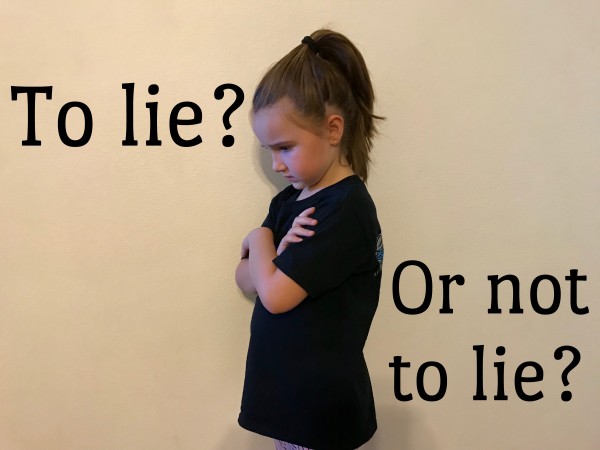
Your kid is lying and it’s making you crazy.
In most cases lying is just a phase that many kids go through and with a little “Truth Training” as I like to call it, they will soon learn how much better it is to be honest.
The concept is simple. The lesson we are trying to drive home is: The truth is always the best decision, even if you did something wrong.
Before I explain how that’s taught, first let me tell you that if your child is lying about everything-wether they’ve made a mistake or not- again, keep in mind it’s probably a phase and the same principle will apply. Here are the 3 simple steps to get your kiddo to choose honesty;
Step 1. Explain to her (or him) that lying is one of the worst things she can do, and while you’ll be upset if she’s done something that she knows is wrong, she won’t be in nearly as much trouble if she tells you the truth. Reiterate that truth is always the best option.
Step 2. You will explain to her that you are going to give her one more chance to tell the truth, and then explain what the consequences will be if she tells the truth versus the consequences if she chooses to lie.
Example- You tell her she needs to eat her apple slices before she is going to get a cookie. She lies and tells you she ate the apple slices. You say,
“I want you to tell me the truth. If you lied to me I’m going to be upset, but I will be very proud of you for telling me the truth and I will let you have the cookie. If you lie to me, you’re not going to get the cookie, and you are (fill in blank with your preferred method of punishment) going to sit in time out.”
Step 3. Disappointment and praise. Explain your disappointment that she chose to lie to you the first time you asked, but praise her for deciding to tell the truth. Reiterate the importance telling the truth.
She admits she lied about eating the apple. You reply,
“I’m very disappointed that you lied, but so very, very, proud of you for telling the truth! I’m going to let you have a cookie but please remember, it’s SO IMPORTANT to tell the truth. Always.” Then give her the cookie.
Of course she can’t continue to get away without punishment for wrong doings, but you want to establish how much better it is to tell the truth. Even when carrying out punishments, you still want to be maintaining the idea that the truth is a better option.
Example- You see a doll go flying across the room in the direction of her sister. She lies about throwing it. You say “Now is your one chance to tell me the truth. I’m going to ask you one more time if you threw the doll. If you did throw it, then baby doll is going to timeout because you could have hurt your sister if she’d gotten hit. Plus, you know not to throw toys. But If you tell me the truth, I will let you play with your other toys and when baby doll gets out of time out I will give her back to you to play with again. If you lie to me, all the toys are going to time out and you won’t have anything to play with.” Then ask her again if she threw the doll.
Children will almost always choose the easier option and over time will associate the truth as the best alternative, even when they’ve made a mistake. Eventually, they will learn to stop lying all together. It just takes time and consistency.
The same principle can be applied to older children as well;
“Did you really do your homework? If you didn’t than I’m going to be upset that you lied and you will loose your electronic privileges for today. But, I will still allow you to play outside and go to Kevin’s house after you finish your homework. If you lie to me, you lose your electronics for today, and tomorrow, and you will be stuck in the house for the rest of the day helping me fold laundry. So, this is your final chance. Did you do your homework?”
Sometimes, there are children that will cling to a lie even when given both sets of consequences. If that’s the case, you explain to them that you know they lied, that lying is an awful thing to do, and tell them you are very disappointed in them. Explain to them that when they choose to lie they are also choosing the punishment that comes with lying. Then you follow through with the punishment you’d already warned them about.
Let me just say that again because it’s so important-FOLLOW THROUGH WITH THE PUNISHMENT. Once they know that you are going to do as you say, they will eventually realize that admitting the truth is a more favorable option for them.
Now- GOOD LUCK! I know how maddening lying can be to deal with, but you are not alone in this parenting challenge and you will get through it. I’m cheering for you!
Sending you much Aloha, Tree
This post comes from the TODAY Parenting Team community, where all members are welcome to post and discuss parenting solutions. Learn more and join us! Because we're all in this together.
